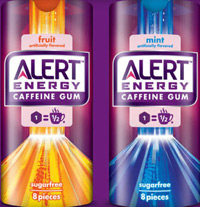food and beverages
Caffeinated Gum: Tip Of Consumers' Additives Concerns
- by Karlene Lukovitz @KLmarketdaily, May 10, 2013

The news that Wrigley has put the brakes on its new Alert Energy Caffeine Gum after controversy around the product helped push the Food and Drug Administration to announce that it will launch a study of caffeine in foods and beverages looks to be just one more indicator of consumers’ increasing concerns about food additives.
The FDA announced that it will take a “fresh look” at the effects of caffeine in foods and beverages, particularly on children, just days after Alert’s late-April launch.
Wrigley said that it has “paused production, sales and marketing” of Alert, which contained about 40 milligrams of caffeine (about the same as in a half-cup of coffee), “out of respect” for the FDA.
advertisement
advertisement
“After discussions with the FDA, we have a greater appreciation for its concern about the proliferation of caffeine in the nation’s food supply," said Casey Keller, Wrigley’s president for North America. “There is a need for changes in the regulatory framework to better guide the consumers and the industry about the appropriate level and use of caffeinated products.”
FDA Commissioner for Foods and Veterinary Medicine Michael R. Taylor subsequently issued a statement applauding Wrigley’s decision to “pause” Alert’s production, noting that the action “demonstrates real leadership and commitment to the public health.” He added: “We hope others in the food industry will exercise similar restraint.”
On April 29, Taylor had issued a statement on the launch of “a new caffeinated gum.”
“The only time that FDA explicitly approved the added use of caffeine in a food was for cola, and that was in the 1950s,” he wrote. “Today, the environment has changed. Children and adolescents may be exposed to caffeine beyond those foods in which caffeine is naturally found and beyond anything FDA envisioned when it made the determination regarding caffeine in cola. For that reason, FDA is taking a fresh look at the potential impact that the totality of new and easy sources of caffeine may have on health, particularly vulnerable populations such as children and youth, and if necessary, will take appropriate action.”
The Wrigley development is, of course, only the latest in the growing controversy about caffeine. Issues relating to the health effects of consumption of energy drinks by teens and young people have been most visible. (The latest there, as reported by Marketing Daily, is dueling lawsuits between Monster Beverages and San Francisco’s city attorney.)
Last year, in response to calls for an FDA investigation of caffeine’s health effects by two senators, the FDA stated that while it was still conducting a review of recently published safety studies on caffeine, “the available studies do not indicate any new, previously unknown risks associated with caffeine consumption.” The FDA had also said that while it had not identified clear links between emergency room visits and other medical problems that some have attributed to caffeine consumption, it was continuing to monitor energy drinks, and that new scientific information could at some point cause it to change its current regulations.
But the growing number of caffeine-added food and beverage products now being marketed by companies looking to tap into the fast-growing “energy” products market – -- Jelly Belly Extreme Sport Beans and Frito-Lay’s Cracker Jack’D being just two examples -- has added to consumer concerns.
Furthermore, those concerns increasingly focus not just on caffeine, but all kinds of additives in food. And as Reuters reported on May 8, there are signs that this may push the FDA to review its food-additive regulations, last revised more than a half-century ago.
In that time, the number of chemicals in the food supply has risen from fewer than 2,000 to an estimated 10,000, many of which are never reviewed by the FDA, Reuters pointed out. It also cited research by the Pew Charitable Trusts showing that at least 3,000 chemicals used in food/beverages have never been reviewed by the FDA, because they have either been maker-affirmed as falling under FDA's “generally recognized as safe” or GRAS categories, or as falling under Flavor and Extracts Manufacturers Association guidelines.
“Our system really puts the onus on us to prove harm,” FDA Commissioner Margaret Hamburg said while speaking at the Reuters Health Summit this week, Reuters reported. “It’s perhaps a time to look at what the legal framework looks like and what opportunities there are now to ask and answer questions in new ways because of advances in science and technology.”


